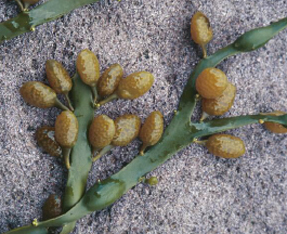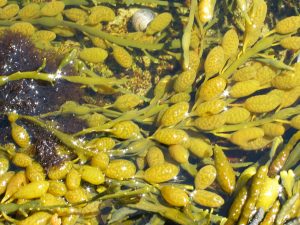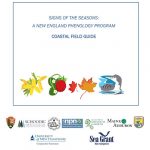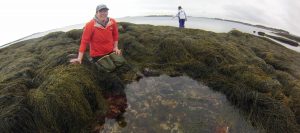Resources for Coastal Observers

For volunteers having access to the shoreline, Coastal Signs of the Seasons is an opportunity to provide scientists with information on an ecologically and economically valuable species. Coastal observers measure the growth and development of the brown alga, Ascophyllum nodosum, which is commonly called “rockweed” or “knotted wrack.” Seasonal reproductive changes in this species are affected by environmental conditions, such as water temperature. By closely monitoring this rockweed, as an indicator species, researchers are able to examine changes in the intertidal zone that may affect other species that live there.
A lot of information can be gathered through coastal monitoring, but there is also a lot of New England coastline to monitor. The diligent efforts of many volunteer observers can combine to create a robust data set for our collaborating scientists. We invite you to become a citizen scientist observer by monitoring rockweed in your area. Training and equipment are provided.
Please read on for more information and contact us to register for a training session.
What is Ascophyllum nodosum?
Ascophyllum nodosum, more commonly called Rockweed, is species of brown algae or seaweed that is found along the New England coast. It grows on available hard surfaces, including rocks, shells, and dock pilings. Rockweed averages in length between 20-30 inches and can be much longer in areas where its growth is not restricted due to high wave action and breakage.
Why choose this indicator species?

Rockweed has many important roles in the marine ecosystem:
- provides shelter
- provides food
- produces oxygen gas
- reduces carbon dioxide gas
- regulates seawater pH
- absorbs nutrients
And it is also commercially important as a:
- packing material for live lobsters and marine worms
- nutritional additive to livestock feed
- garden fertilizer and mulch
- source of the compound alginate, used as a thickener in many products
Observer Responsibilities
You will be trained in observing and recording data on rockweed phenophases and water quality. Equipment will be provided. You will be responsible for making weekly observations and recording them in a simple online database. We will assist you with the process, which includes:
- Selecting an appropriate site
- Recording your observations
- Entering your observations online
 Signs of the Seasons: A New England Phenology Program Coastal Field Guide (or download the PDF): Our training and field observation handbook shows you how to set up your observation program for the rockweed species, Ascophyllum nodosum. Includes information on how to record your observation data. The handbook provides detailed information on each step, as well as additional resources to help you get started.
Signs of the Seasons: A New England Phenology Program Coastal Field Guide (or download the PDF): Our training and field observation handbook shows you how to set up your observation program for the rockweed species, Ascophyllum nodosum. Includes information on how to record your observation data. The handbook provides detailed information on each step, as well as additional resources to help you get started.
Recording Your Data
Already trained? Plan to travel out to your site at low tide to observe Rockweed phenophases throughout the season. Bring along a Phenophase Datasheet to record both the phases and the water quality. Once a year, usually in the spring, plan to also complete an Age and Growth Assessment at your site.
Download and print data sheets to take into the field using the links below:
- Phenophase Data Sheet: Procedures A & B (PDF)
- Age & Growth Data Sheet: Procedures B & C (PDF) (Note: datasheet has been updated for the 2019 collection season, which begins in March).
After you have collected data, enter it as often as possible using the Coastal SOS Monitoring project on Anecdata:
Click HERE for a link to the Anecdata website.
We have developed a tutorial to walk you through setting up an account on Anecdata, joining the Coastal SOS Monitoring project, and submitting your data. Download the PDF here: Anecdata Tutorial (PDF). We also have a video designed to walk you through creating an account, uploading observations, and viewing data. You can view the video here:
2017 Coastal Research Update (Recorded June 21, 2017):

Curious about how your coastal phenology data is being used? Check out our webinar (below) where Signs of the Seasons collaborating scientist Dr. Jessica Muhlin from Maine Maritime Academy outlines the importance of Ascophyllum nodosum (rockweed) and gives an update on her rockweed research and findings.
